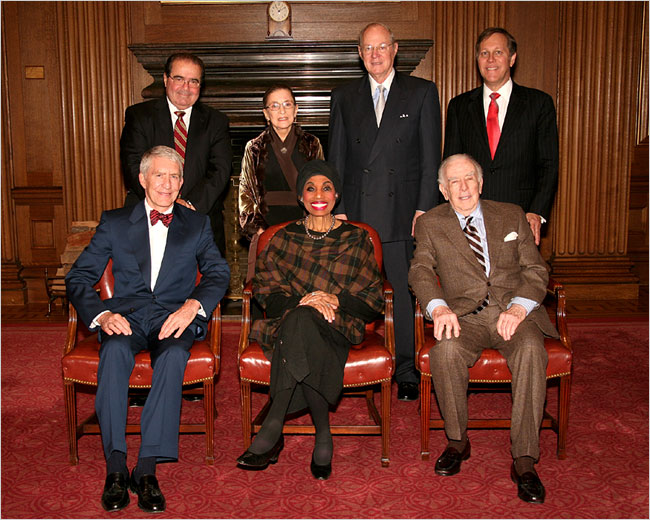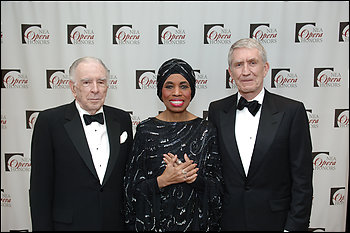I hear there’s an election tomorrow, but I’ve been too busy to think much about it. As I mentioned last week, I just got back from spending three days in Washington, D.C., where I attended a meeting of the National Council on the Arts, and no sooner did I return to New York than I took in two off-Broadway shows, Black Watch and Romantic Poetry. That’s my life, and I shouldn’t ever complain about it, though sometimes I do. But I couldn’t come up with a single thing in the world to grouse about last Friday, for I spent the afternoon lunching at the Supreme Court Building with Associate Justices Ruth Bader Ginsburg, Anthony Kennedy, and Antonin Scalia, along with three of the four winners of the first NEA Opera Honors, one of whom is none other than Leontyne Price.
 I was on hand to introduce another of the honorees, Richard Gaddes (front row, left) of the Santa Fe Opera, to the assembled luminaries, of whom there were plenty. Dana Gioia, the outgoing chairman of the National Endowment for the Arts, shared ceremonial duties with Justice Ginsburg. Carlisle Floyd, the composer of Susannah and Of Mice and Men and another of the honorees, was introduced by William Bolcom, the composer of A View from the Bridge and the husband and recital partner of Joan Morris. (James Levine, the fourth honoree, was stuck in New York, rehearsing the Metropolitan Opera in The Damnation of Faust.) The handsome conference room in which we dined was packed with opera-loving Washington types and lined with formal portraits of the court’s previous chief justices. It was, in short, quite a party.
I was on hand to introduce another of the honorees, Richard Gaddes (front row, left) of the Santa Fe Opera, to the assembled luminaries, of whom there were plenty. Dana Gioia, the outgoing chairman of the National Endowment for the Arts, shared ceremonial duties with Justice Ginsburg. Carlisle Floyd, the composer of Susannah and Of Mice and Men and another of the honorees, was introduced by William Bolcom, the composer of A View from the Bridge and the husband and recital partner of Joan Morris. (James Levine, the fourth honoree, was stuck in New York, rehearsing the Metropolitan Opera in The Damnation of Faust.) The handsome conference room in which we dined was packed with opera-loving Washington types and lined with formal portraits of the court’s previous chief justices. It was, in short, quite a party.
In the crowd was my colleague Tony Tommasini of the New York Times, who was scurrying around the room with pencil and pad in hand. “You’re not working today, are you?” I asked. He nodded ruefully. “Not me,” I said with a smile. “I’ve got the day off–or, rather, I’m wearing a different hat.”
I knew in a general way that the three Supreme Court justices hosting the luncheon were opera buffs, but not until Friday did I learn just how buffy they are. Justice Ginsburg, it turns out, is both a devoted operagoer and–brace yourself–a longtime fan of the Santa Fe Opera. “Once I discovered the Santa Fe Opera, I stopped going to Salzburg and Glyndebourne,” she said in her welcoming address, a witty and exceedingly learned talk on lawyers in opera in which she pointed out that (A) there aren’t many of them and (B) they’re mostly crooked. Nor are Justices Kennedy and Scalia far behind her in their enthusiasm for the art form of which I have lately become a part-time practitioner.
The Sunrise String Quartet supplied appropriate background music as we all ate our chicken piccata, playing instrumental arrangements of popular arias. My chair faced away from them, but I half-noticed midway through the meal that they’d struck up “Un bel di vedremo,” the best-known aria from Puccini’s Madama Butterfly. Then I heard a smoky soprano voice singing along softly but beautifully, floating Puccini’s high notes with perfect poise. A ripple of excitement fluttered through the room. I turned around and saw Leontyne Price singing the aria from her seat, sounding not like an octogenarian retiree but like…well, Leontyne Price. We all clapped and cheered wildly when she was done. “Once a diva, always a diva,” I whispered to the ambassador on my right, wiping a tear from my eye with my napkin.
 After lunch came the introductions of the honorees. I had hastily scribbled an additional improvised line into my speech during Justice Ginsburg’s remarks, and I wondered as I walked to the podium whether it was appropriate to the occasion. I looked out at the audience and realized, much to my surprise, that I was more than a little bit nervous. I took a deep breath and started talking:
After lunch came the introductions of the honorees. I had hastily scribbled an additional improvised line into my speech during Justice Ginsburg’s remarks, and I wondered as I walked to the podium whether it was appropriate to the occasion. I looked out at the audience and realized, much to my surprise, that I was more than a little bit nervous. I took a deep breath and started talking:
The word “great” is not often used to decribe impresarios, but it is the right word for Richard Gaddes. He has led not one but two major opera companies, the Opera Theatre of St. Louis, which he founded, and the Santa Fe Opera, from which he stepped down at the end of this season.
In St. Louis he invited Louise Nevelson to design her first stage set, gave Jonathan Miller his American directing debut, and launched the careers of Jerry Hadley, Thomas Hampson, Susanne Mentzer, Sylvia McNair, and Vinson Cole. In Santa Fe he devoted himself no less assiduously to cultivating the careers of promising young artists, overseeing one of America’s first and foremost professional development and training programs. In both cities he programmed a long and impressive string of operas old and new.
I have personal reason to know of Richard’s commitment to new opera, for he commissioned Paul Moravec and me to write our first opera, The Letter, which will be premiered next July at Santa Fe.
I looked up from my text and caught Justice Ginsburg’s eye before reading the line that I’d added a few minutes earlier:
One of the principal characters is a lawyer!
The room was dead silent for a split-second. Then Justice Ginsburg started laughing, and so did everyone else. I grinned and went back to my prepared text:
I hope that our opera will uphold Richard’s hard-earned, well-deserved reputation as an impresario of taste, elegance, adventure, and wisdom, for all of which he will always be remembered throughout the world of music.
Afterward I made a beeline for Justice Ginsburg’s table and invited her to come to the opening night of The Letter. “Of course I’ll be there, and so will my husband,” she replied. By then Justice Scalia had already vanished into the crowd, but I was introduced a moment later to Justice Kennedy, who told me an anecdote about a family of Chinese classical musicians who had miraculously managed to survive the Cultural Revolution. I turned to the woman next to me when we were finished talking and saw that she was Leontyne Price.
“I’ll never forget the sound of your voice today,” I said, doing my best to keep my own voice under control.
“Well,” she replied, “I wanted to show everybody that I could still sing a bit, even though I’m eighty years old!” And all at once I was embracing her.
The ceremony had run overtime and I had to leave for New York at once, so I said a hasty but heartfelt farewell to Richard Gaddes, ran down the marble steps of the Supreme Court Building, and caught a cab that rushed me to Union Station. As I galloped through the front door, I nearly knocked down a heedless tourist who was talking on his cellphone. “We just got to Washington,” he told the person on the other end of the line. “I wonder if we’ll see anyone famous?”
You just might, friend, I said to myself. You just might.
* * *
Anthony Tommasini’s New York Times report on Friday’s ceremony is here.
